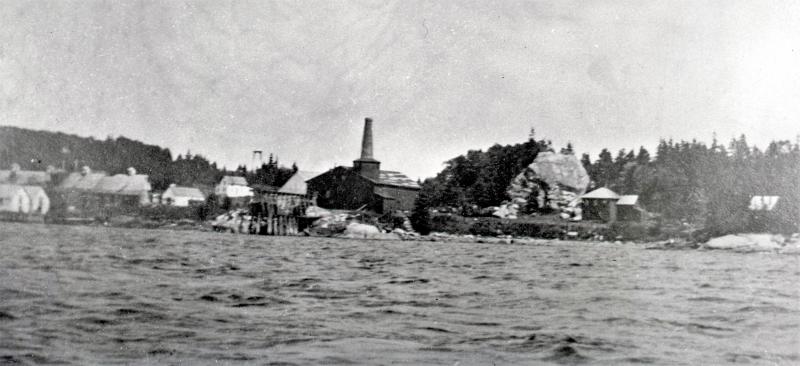I wrote this article in 1991, during my third year of writing articles for the historical society that appeared in the Register. It is slightly revised and lengthened.
In 1985 my eighth-grade son Keith was assigned a local history project. We knew our Linekin Neck home had been part of a late 1800s pogie (fish) factory so that seemed like a good topic. Talks with townspeople narrowed down some likely sources: Clyde Dodge, Everett Vannah's daughter Mary Alice Fairley, and Pete Jones (born 1899, died 1991). Pete's father, Jainus Jones, had come to town to teach at the Linekin school, now a private home just a little bit north of the turn to Little River. Jainus had also been bookkeeper at our pogie factory in the late 1800s, one of five such factories on Linekin Neck at that time. The factory had been supervised by Osgood Vannah, grandfather to Mary Alice, and had thrived (as long as the pogies lasted) in the approximate area of Paul Luke's boatyard on Linekin Neck. Young speed demons know the area as that spot just as you look right to Linekin Bay while airborne under "thrill hill" heading for Ocean Point.
Pete and Pogies
Keith and I went to see Pete at his East Boothbay home on School Street in December 1985. Keith and I were equally ignorant of old times here; local history was not among my interests then. We talked for some time with Pete and he acquainted us with the Neck as it was back when he was a kid in the early 20th century. He also dredged up what he'd heard or had known of earlier conditions from his parents and others. We learned a lot about the many buildings that had been on the factory property; the Cape Verdean blacks brought up from Cape Cod each summer to supplement the local work force; the processes used to extract the oil and flesh with the immense steam pressure involved; and the steamers that brought the fish in, announcing their catch while at sea by whistle signals which gave the factory some time to gear up before their arrival. After an hour or so, we had the gist of it and could refine details. And we understood why there were coal ashes and clinkers all over our three acres of property.
I remember how it suddenly dawned on me that the factory didn't run year-round. I said to Pete, "Oh, you mean it only ran in the summer. What did everybody do the rest of the year?" It seemed like a simple question to me at the time but he gave me a funny look and was real quiet for a minute or so. Looking back now, I think I know what must have been going through his mind: probably something along the lines of, "How can anyone be so numb, and how do you let them know gently?"—always a great jumpstart to the learning process.
March Hill
That, of course, wasn't his answer. He just finally looked up after being silent for a while, fixed me with a look, and asked, "Have you ever heard the expression 'getting over March hill'?" I said that I hadn't. Then he said, "They just about starved to death. If you made it through March, up over March hill, you'd probably make it through the year. They did just about anything they could to survive." I really didn't know what to say. Part of me wanted to pass it off with: "Just a guy trying to shock me with how hard it was in the old days." The other part of me was the me who sat in his house, his words having sent a chill down my spine, knowing, no matter how foreign it was to my upbringing and experience, that it was all true.
Next time this article concludes.

























